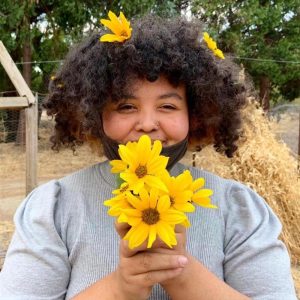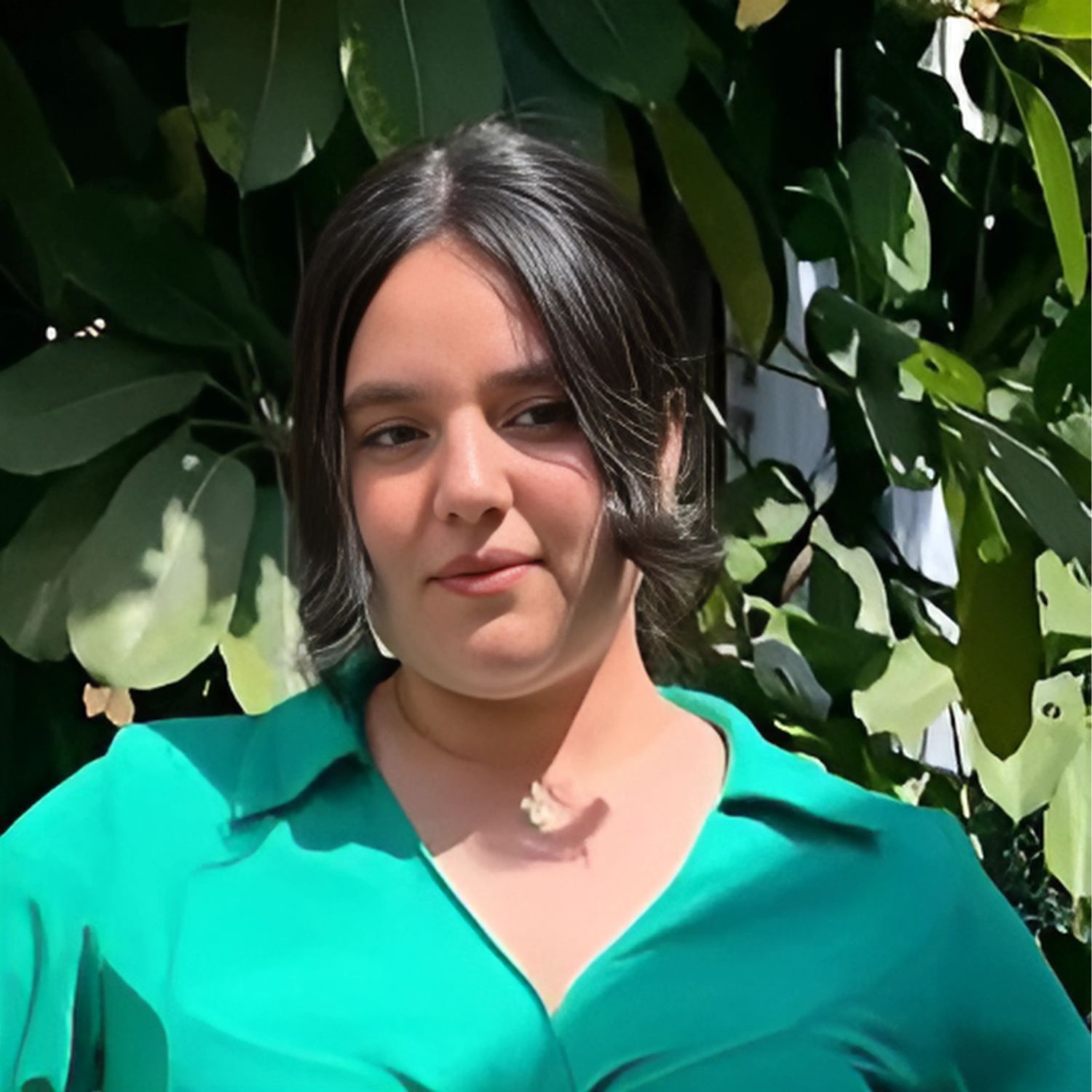
Tehya Jackson, 18 years old, is a new BA student this year. Before coming to DRBU, she saw herself in a role as an activist for the Native American and Black community. What does she think of this new community, which seems so different from where she came from? How is she doing a month after she arrived? This interview was done on a warm Saturday evening in the backyard of the newly renovated DRBU C-Dorm on CTTB campus.
Q: How do you feel at this moment?
Like a creek, still flowing, but very subtle. I had a question that occupied my mind lately, but now I don’t remember what the question was. 🙂
Q: What brought you to DRBU?
My yearning for a different type of education. I did very well in middle school and high school but struggled a lot in the college I went to for two years. I found DRBU very different when I read the website. During the interview, I felt a sense of caring and support. But it did concern me — what if this community is too small for me to fit in? (laugh)
Q: Do you think you’ve made the right decision to come to DRBU?
Yes, for sure! I missed my family initially, but soon I felt natural. I feel [at] home here because of the close relationships between community and students and academics. I think these close relationships should be the foundation of education because you are raising the future. You are helping them understand. You help them cultivate. That’s a very personal thing. Everyone learns differently; everyone grows differently. That’s why it’s so essential to have these close relationships.
Q: What part of the DRBU’s education fosters those close relationships?
Shared inquiry between students and how faculties are open to students’ ideas. I was curious about the shared inquiry, where people can have different perspectives. In other schools, there may be a two-hour-long lecture, and hardly anyone asks questions. Some people don’t even know what questions to ask because they don’t understand what has been said. DRBU is not lecture-based. The faculties may not have the answer but take the time to consult someone who might have the answer or read something and then get back to you. They will always support you when you need advice or something. In most of our classes, we do check-ins and meditation.
Q: How do you usually feel when you wake up in the morning?
It depends on when I wake up. If I wake up for the morning ceremony at 4, I usually feel a bit tired, and also anxious. Did I wake up early enough? Will I make it on time? What kind of experience will I have at the morning ceremony? Sometimes if I wake up later, around 6 or 7, I may feel I should’ve got up earlier so I can do some type of practice. Sometimes, I feel, well, I am glad I woke up. I slept in because I also need to listen to my body. That’s also essential in cultivation. Listening to our body. That’s how I feel when I initially wake up. But eventually, I wonder what will happen today. It’s also not setting expectations.
I never thought [that] I shouldn’t set any expectations, but since I came here, it’s been so much easier to let go of them. And it makes my life so much easier not having expectations for most things. When I do find myself setting expectations, it doesn’t turn out well. I need to just step back and say, “Okay, I need to let go of this expectation.” And I need to start thinking about how I can solve this problem because it didn’t meet my expectations. I need to change my perception.
Q: How about at night when you look back at the day, how do you feel?
On a weekday, I feel good; I feel I’ve learned a lot. And I feel excited for what’s gonna happen next week when we have those same classes. Or I feel very grateful, the sense of wholeness in myself. Because maybe the meditation I did was really good, or even when I’m in the kitchen washing dishes, that’s also very meditative for me. I’m able to go into this trance and I feel very peaceful. While in the past, I hated doing dishes. But now I really enjoy doing dishes! (laugh)
Some days, there will be instances where maybe I’m not able to get through to people, and I’m just thinking, “Why doesn’t anyone understand what I’m saying?” Or, “Why am I not able to communicate this message with this person?” It’s the cycle of anger. Sometimes I go to sleep like that. But then in the morning, I try to let go of that. It doesn’t always happen. Sometimes it will pop up in the middle of the day. It’s just a practice trying to let go of them.
Q: Are there any challenges so far?
Sometimes in shared inquiry. I’m getting more used to it now. But, like, the first week, when I was still adjusting… What if I don’t have anything good to say in shared inquiry? And then going into shared inquiry. What I’m thinking might be totally different from what everyone else was thinking. Maybe what everyone else was thinking seems much more unified than what I was thinking. Am I right? Are they wrong? Or is there some kind of middle ground? And even speaking up can sometimes be a challenge. But it’s definitely getting much easier, especially because my classmates, during lunch or whenever, would come up to me and say, “Hey! I really liked what you said. I really wish you would speak more because I really enjoy hearing what you have to say. And it really changes the flow of the conversation and how I’m thinking about it.” I think that’s very encouraging.
Q: When you decided to come to DRBU, did you see DRBU as a stepping stone or were you planning to completely dive into the unknown?
Honestly, I’m not sure. Before coming here, I was looking through all the videos [on the website], and I saw everyone saying, “This is the place if you want to change yourself. This place is going to change you, no matter where you are at.” I was like, “Hmm, I wonder where that’s gonna take me because it’s so hard to view myself in my present state. That makes it so much harder to view myself in a changed state.” If that makes sense.
Q: Before you found out about DRBU, did you have any dreams?
Before DRBU, I actually wanted to go to art school, and I wanted to become an illustrator, probably for children’s books. Or I wanted to be an expressive art therapist. Helping other people is my passion, whether it’s through books or through therapy. And especially I was leaning towards expressive art therapy because mental health is so lacking in the indiginous community and in the community of color in general. And I wanted to be able to give back to my tribe but also the tribes that have raised me, helped me, and I wanted to help raise youth so that they didn’t have to go through the struggle that I’ve seen so many of the present and past generations have to go through. I want to make life a bit easier for them. I want to let them achieve happiness, less painful than what I and so many others have to go through, things that aren’t necessary to…hmm…how should I put this? They are not necessary in your process of learning and growing as a person. If that makes sense.
Q: Do you think DRBU can help you go toward that direction, or are you completely open now? Do you still hold the same vision?
Yeah, I think it’s not the main focus of my life as much as [it was] before coming to DRBU. I was stuck in the state, “That’s what I have to do in my life. I have to become a better person so I can make things easier for people.” But I was neglecting myself. And so I came to DRBU, hoping that I would learn to communicate with myself and take care of myself better here so that I can also do that for other people. Because I’ve come to learn that, unless I start taking care of myself, I can’t take care of other people, not in the most efficient way. So since I came to DRBU, while in my everyday life, I’m still thinking about other people or things that I can do to help, I let go, in some elements, the bigger picture, which seems to stress me out outside of DRBU. And now I’m focusing on myself.
Q: Is there anything in your heart that you want to express but nobody has ever asked you?
Not at the moment. Because if I feel there is a burning question, especially in this environment, I will go ask someone or talk to someone about it. So for most things that came up, I have been able to settle. So I don’t have any burning questions as of now.
Q: Can you give me an example when you feel being cared for in this community?
I think the example that comes to mind first is my classical Chinese Teacher, Yihuan. She is just really caring. And she is always asking, “How are you doing? Is there anything I can help you with? Did you drink lots of water?” She is also my Buddhist classics teacher. When I am going through something, I think she is someone I feel most comfortable talking with. Because I think she just understands me. So it’s very easy to be open with her. And she is very insightful. When she doesn’t have the answer, she talks to someone who does and makes sure she always gets back to me.
Q: How about your cohort? You have a very tiny cohort. 🙂
(Laugh) Yeah, Sehen. He is very caring in a different way, something that I’m growing to understand. When we did our first paper in Rhetoric and Writing, I was very curious as to what he thought of my paper. I felt the sense of care when he was giving me feedback because it was like he was listening to what I was saying, and he was resonating with what I was saying. I think that was a very wholesome feeling. And then you know, whenever he sees me, he asks, “How are you doing?” I am a very forgetful person. I forget things all the time. (laugh) So I email him or text him, “huh…what are we supposed to do for class?” He’ll tell me, “Oh, we are supposed to do this and this.” I say thank you, and sorry I ask these questions. He says, “No no. We are in the same cohort. It’s okay to ask these questions.”
Q: Did you have any spiritual practice before coming across Buddhism?
No. My first spiritual practice is going to the morning ceremony and evening ceremony at DRBU. More formal practice, I guess. Actually, I was just writing this paper about the cultivation of nothingness, which is something we learned a lot about in the first week here. We are still learning about it. Basically, learning to let go. Start to unlearn everything that we’ve learned and stop limiting everything in our lives and really open up our minds. And that, I think, is something that, not just me, but everyone has been doing since birth. When you are a baby, what does a baby think in a womb? What does a baby perceive? At one point, I am sure there is nothing that a baby perceives, which is, you know, the beginning.


